#this is my idiosyncratic fantasy setting with magic
Text

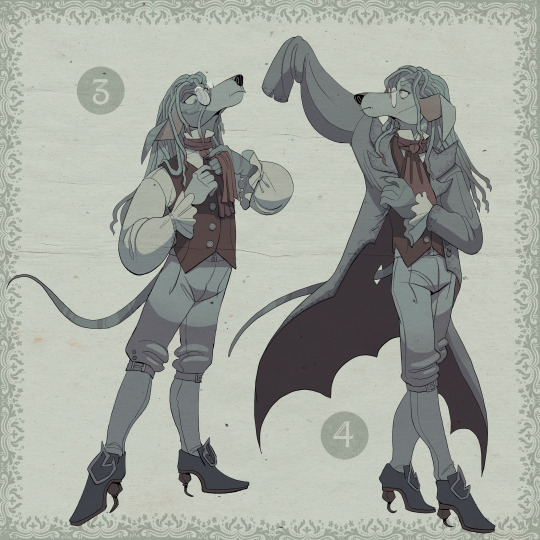
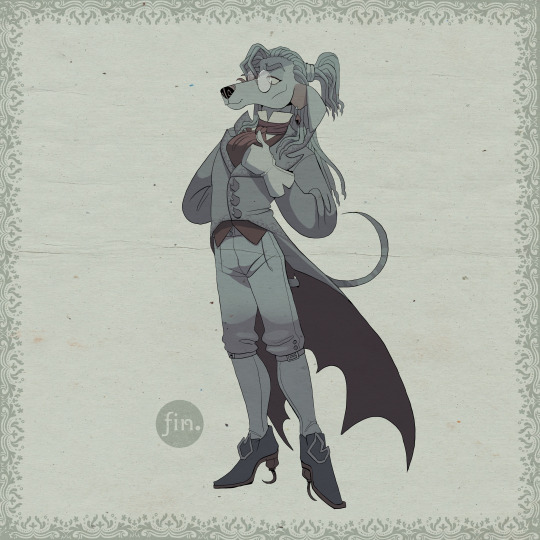
(youtuber voice) Hiii, today we'll be getting dressed in the hottest 1796 styles!
Midlanders wear a lot of layers. Yet Lucas insists on getting ready by himself. The servants used to try to help, but he hisses like a threatened cat every time.
#furry art#fantasy fashion#original character#oc design#dog furry#georgian era#hey historical fashion people dont kill me#this is my idiosyncratic fantasy setting with magic#oc: lucas#world: forever gold#trying to stretch my drawing muscles again post-NaNo
82 notes
·
View notes
Text
New TTRPGs In June and July 2024
Welcome to another itch.io round up. If this is the first post like this that you’re seeing: every two months I highlight around ten new games. Most of these games are small in scope and I usually have not played or even read them. I’m often just picking them based on whats caught my idiosyncratic eye. I hear about most of these games through this form.
False Kingdom: Survive a succession crisis in 12th century England playing delightful named characters with hilarious special abilities. From Jim R and Marsh D, the designers of TEETH. (PWYW)
Freak Folio: The artist known as Chaoclypse releases a book where you mix and match monsters to create abominations for your fantasy game.
The Girls of the Genziana Hotel: Chambermaids investigating the disappearance of one of their own in a spooky 19th century German hotel. (Hendrik ten Napel, PWYW)
Against Time and Death: Two-player game of war, self-discovery, and connection across all of time and space. Inspired by This Is How You Lose the Time War. (Nick Bate)
Tarnation: Solo journalling in a weird west setting with multiple pre-made adventures. (Symbolic City)
For Small Creatures Such As We: Solo or GM-less game about a human captain and a crew of aliens where you explore the galaxy and your relationships. (Anna Blackwell)
’till it kills us: A game about queer activism, mental health and the delicate balance between the two. Uses a system that requires you to work together to use your cool powers. (Damsels & Dice)
Paranormal Wellington: A comedy roleplaying game about bumbling TV investigators and supernatural shenanigans. (Morgan Davie)
Fight or Fright: A Halloween Trick-or-treating game about magical costumes, possessed decorations, and scoring lots of candy. (Alex Marinkovich-Josey)
Fording the Derbal Yerrigan: A game about removing an invasive species that uses an Uno deck. (Pidj Sorensen)
That’s all for this week!
(As always, this was first posted on the Indie RPG Newsletter).
151 notes
·
View notes
Note
So, I have a character in an urban fantasy setting who's a pre-teen child thrown into dangerous situations. Now, I'm well aware untrained kids don't do well, to put it lightly, in dangerous situations. The one advantage my character has is that they have overwhelming magical power they can't control. They also have a mentor who has a lax standard of safety since they lived the Child Protagonist lifestyle and they survived. What kind of dynamic would arise from this?
So there's a big problem here, and it's not the protagonist, so let's start with that.
Writing kids in urban fantasy is extremely tricky. A lot of the kinds of situations you'd normally work with can't incorporate a child. In most cases, your character can't really operate independently without other characters getting suspicious, and eventually involving the police or other authorities.
The bigger problem is the whole, “uncontrolled,” part of their overwhelming magical power, because that's a lie. They may not have direct control over it, but you do. Worse, your audience knows it, and by the time it matters, they'll have a pretty good grasp of how you're willing to use that power.
The trick to making these kinds of situations work is when the uncontrollable power is exercising its own agency in the story. It may be an actual character in its own right, or it may simply be an unknowable, idiosyncratic force. Now, with the setup you're suggesting, that can be downright horrifying, especially if the character isn't the protagonist. If you introduce a child into urban fantasy where their imaginary friend has very real, and very destructive, powers, that can be an extremely unsettling hook.
Actually, stepping back for a moment, magically empowered kids make fantastic villains in urban fantasy. They neatly sidestep the question of, “why don't you just double tap the monster in the back of the head with explosive rounds?” Because you can't do that to a kid, especially if they're not actively malevolent. (It's a little different when you're dealing with an unspeakable cosmic horror that's wearing the skin of a child like a worn out sock.) More than that, they have an incredible capacity for cruelty without regard for the consequences. A child with magical powers is scary as hell. (And I'm not just saying this because of that Twilight Zone episode.) If you isolate out their magical powers into a distinct entity that operates in parallel to the kid (again, the imaginary friend), that can get really horrifying, especially if it's unclear what the relationship between the child and the magical being is. There's even options here whether the magical force manifests physically (for example as an animated toy) or is entirely incorporeal.
As a protagonist, it's a lot more difficult. You have a character that simply doesn't have the capacity to fully understand the full nuances of the situations they're dealing with. If their uncontrolled magical powers are another character, (again, the imaginary friend comes to mind as an immediate template for this structure), then you start to open up options a bit, but you're going to be asking that character to shoulder a lot of the weight for the situations the child finds themselves in, and you are going to drastically undermine the threat your character faces. There's nothing wrong with the idea of a kid in an urban fantasy setting, who's accompanied by their benevolent (and very violent) shadow monster, but it's a very different dynamic from a kid with godlike powers and no concept of morality. Also, as a protagonist this dynamic can get tricky because the child, and monster, might identify non-malicious actions as threats. It's entirely understandable if the shadow monster rips apart a couple patrol officers because they scared, and tried to take, the kid, but if these are your heroes, this is going to be a bumpy ride. Also, this actually worse if you're not personifying their powers, because the kid might simply murder the cops, with magic, if they scared them.
Like I said, writing kids is difficult, unless you're interacting with them on a fairly regular basis. If you're not, I wouldn't recommend this. Child protagonists are doable. Child protagonists in urban fantasy are very tricky. Honestly, kids do much better in portal fantasy because of the genre conventions. Children as PoVs in urban fantasy is something I personally avoid, (and when I do violate that, it's more in the vein of a cosmic horror wearing a sock.)
Leading into the beginning of this question, it's kind important to remember: No one else knows your characters as well as you do. I don't know who your protagonist is. I've got a five word prompt, and no idea what you're doing beyond that. I can make guesses, but I can't even begin to articulate what kind of magical power your character might possess. Are they a wild mage? Are they possessed? Are they a werewolf? I don't know. These are problems when these are very real possibilities. And it's not like you can't do a very compelling story about an orphaned werewolf stranded in the city, hundreds of miles from the surviving members of their pack, with no idea how to navigate back to them. But, that's going to be a very different story from a kid who accidentally summoned a transdimensional shadow monster, and is now trying to help their new friend find a way home.
There's a lot of possibilities, but I don't know which ones you're looking for.
-Starke
This blog is supported through Patreon. Patrons get early access to new posts, and direct access to us through Discord. If you’d like to support us, please consider becoming a Patron.
#Starke Answers#How to Fight Write#writing advice#writing reference#writing tips#urban fantasy#I missed the Mentor part of the question
163 notes
·
View notes
Text
Too much academic reading makes it strangely difficult to go back to just reading shit for enjoyment. Even when it’s really fucking good.
I’m reading an excellent book called Perilous Times. It’s about Arthurian Knights, racism, nationalism and the climate crisis. I’m literally doing a bunch of underlining and saving the good bits because it’s letting me concentrate on reading both this book and the next Rivers of London book, which I preordered last year and appeared in my Kindle library, as things do.
I will probably end up sharing some of the excellent lines here because it is very very good.
I have a lot of ideas about why fantasy, and other literary techniques like modernist writing and magical realism, makes reading and writing about awful real world shit easier than reading straight realist fiction about them.
I think it’s to do with how they invite you to process it. Straight realism is the language of the news. It excludes the reader. It tells you the awful shit has already happened; it’s set in stone, and you could never have done anything about it anyway. The other techniques are inviting - actively inclusive. They invite you in to collaborate on the story with the writing itself. To bring your own ideas and your own experience of the awful things to the experience of reading.
This might be a very idiosyncratic, personal experience, btw - it might be about how my mind works. But I don’t think so?
I feel writing fantasy about the climate crisis, racism, transphobia, queerphobia, disableism and social change is activist in a way writing straight realist fiction about it isn’t. It’s inviting the reader into a world where we have power and things can change, without excluding or minimising the painful cost of the change.
It’s why I feel Pratchett keeps being so endlessly applicable - almost *terrifyingly* so - to things that have happened after his death.
#perilous times#terry pratchett#literary techniques#writing fantasy about awful things is activism#rivers of london#discworld#racism#nationalism#climate crisis#transphobia#queerphobia#literary activism#academia fucks you for reading for pleasure a little
22 notes
·
View notes
Text
255: Amorphis // Elegy

Elegy
Amorphis
1996, Spinefarm
A woman I was sleeping with once asked me while we were lying in bed in the darkness if there was any poetry I could recite from memory. Reader, I had nothing, so I ended up sleepily intoning these words:
Truly they lie, they talk utter nonsense.
Those who sing music
Reckon that the kantele
Was fashioned by a god
Out of a great pike’s shoulders,
From a water dog’s hooked bones…
It was molded from sorrow.
Its belly out of hard days,
Its soundboard from endless woes,
Its strings gathered from torments
And its pegs from other ills.
Truly they lie, they talk utter nonsense.
Then she wept. I’d mentioned the words came from the Kanteletar, a Finnish collection of traditional folk poems collected in 1840, but I wonder if the reaction might’ve been different if I’d gone on to say that I’d learnt them from “My Kantele,” a song from idiosyncratic death metal band Amorphis’s third album Elegy. (Possibly not; she was the sensitive type.)
youtube
Amorphis is probably my favourite metal band of the ‘90s, moving over the course of four albums and a coupla EPs from a hoarse death-doom croak to an uncategorizable psychedelic smear of folk, prog, melodic death, and goth rock. Their adolescent fascination with fantasy warfare led them to the deeper well of folklore in all its silliness and strange wisdom; they infused their wintry stomp with the druggy Orientalist prog rave-ups of fellow Finns Kingston Wall. It always seemed like those moments when they found themselves in the zeitgeist were not the result of chasing trends but a happy accident of their own path briefly intersecting the moment, as when Elegy’s bold embrace of keyboards and alternating clean and growled vocals anticipated the Gothenburg melodic death sound that was about to take over the extreme metal scene.
Elegy crunches (“Against Widows”) and Elegy thrashes (“On Rich and Poor”), but mostly it swirls, with new addition Kim Rantala's watery keys and lead guitarist Esa Holopainen’s increasingly Floydian selection of tones lapping over the album’s burly architecture. The selected Kanteletar poems that serve as lyrics tend toward mournfulness, and both growler Tomi Koivusaari and debuting clean vocalist Pasi Koskinen give appropriately panged readings, but as with a lot of genuine folk songs most of the musical settings have a playful zest. It’s an album rife with lengthy, dramatic outros (“The Orphan,” “Weeper on the Shore,” “Elegy”), the band finding a stirring melody and riding it to satisfaction, and if their sudden fascination with Eastern scales and the sitar is geographically inexplicable (why not a kantele on a song called “My Kantele”?) the songs that go that way generally rip.
youtube
There’s a fair amount of cheese to be found on Elegy, but even nearly 20 years since I first heard it as a teen, I find I’m able to take most of it in the spirit it was intended. Elegy’s still kind of way out there on its own as metal goes, doing its magic on a frozen stream that sparkles under the stars.
255/365
#amorphis#relapse records#finnish metal#death metal#prog metal#'90s music#'90s metal#kantele#folk metal#doom metal#kingston wall#music review#vinyl record
3 notes
·
View notes
Text
All the books I reviewed in 2022 (Part I: Fiction)

Every year around this time, I round up all the books I reviewed in the previous 12 months; both as a convenience for readers and to remind myself that I don't need to feel quite so horribly guilty about all the books I *didn't* review (to those authors: rest assured, I still feel horribly guilty).

I should probably mention here that I had a book of my own come out in 2022:
Chokepoint Capitalism (co-authored with Rebecca Giblin)
A solutions-oriented look at how concentration in the tech and culture industries screws over creative workers, filled with detailed proposals for unrigging these markets and getting artists *paid*:
https://chokepointcapitalism.com/
Before I get to this year's books, here are links to previous editions. These are also good books and deserving of your attention!
* All the books I reviewed in 2021:
https://pluralistic.net/2021/12/08/required-ish-reading/#bibliography
* All the books I reviewed in 2020:
https://pluralistic.net/2020/12/08/required-reading/#recommended-reading
Now, on to 2022!
NOVELS:
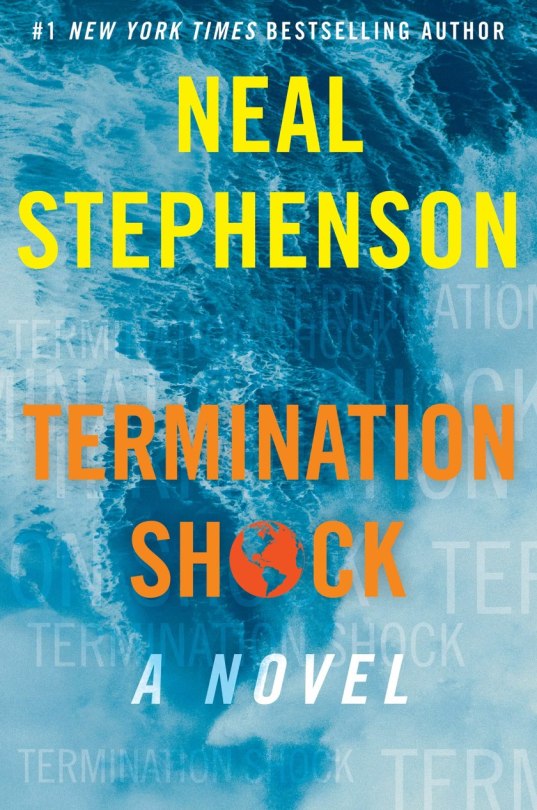
I. Termination Shock by Neal Stephenson
An ambitious, sprawling tale of an eccentric Texas truck-stop magnate who unilaterally begins a program of geoengineering in a bid to cool the Earth by doping the stratosphere with sulfur. A great look at the social and technical dimensions of geoengineering, filled with Stephensonian grace-notes, from superb use of language to delightful, idiosyncratic characters.
https://pluralistic.net/2022/01/04/general-ludd/#geoengineering
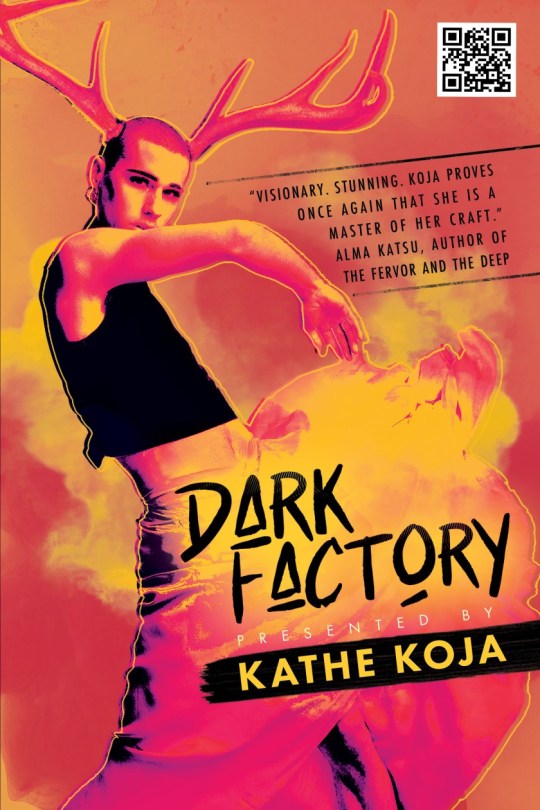
II. Dark Factory by Kathe Koja
Koja – an incredible, versatile writer who has pioneered multiple genres of fiction – presents an "immersive novel," about a high-stakes Bohemian party scene of mixed-reality artists, wealthy dilettantes, weird theorists and the very serious business of fun.
https://pluralistic.net/2022/03/20/a-walk-in-the-park/#all-night-party-people

III. Aspects by John M Ford
The long-awaited, unfinished first volume of a steampunk fantasy series, with an introduction by Neil Gaiman; "what Game of Thrones might have been, if the author had been fascinated by trains…communication and politics, magic, redemption, and the forms that love can take." A book of quiet – but stunning – erudition. Every aspect of Ford's world – its politics, its history, its geography, its magic, its technology, its economics, its mythos – rings true. What's more, every part of it fits together with the rest of it in a way that is so believable that it feels realer than our own world at times.
https://pluralistic.net/2022/04/09/john-m-ford/#aspects

IV. Up Against It by Laura J Mixon
The cracking first volume of WAVE, a space-opera series that manages to be both original — full of smart new ways of looking at science fiction ideas — and old fashioned — full of the kind of whiz-bang action-adventure that made so many of us fall in love with the field in the first place, about high-stakes administration of a space colony, where being good at your job is the utmost praxis. Republished as part of the Tor Essentials line.
https://pluralistic.net/2022/04/25/mj-locke-rides-again/#two-fisted-astro-bureaucrats

V. The Animals In That Country by Laura Jean McKay
An extraordinary debut novel, about a plague of understanding that sweeps across Australia, leaving the infected cursed with the ability to communicate with animals. It's an inversion of the standard trope of people and animals communicating with one another and finding mutual understanding and peace as a result. McKay sets herself the (seemingly) impossible of dramatizing human-animal communication without anthropomorphizing the animals, and then pulls it off – brilliantly.
https://pluralistic.net/2022/04/27/im-a-backdoor-man/#doolittle

VI. Just Like Home by Sarah Gailey
A gothic horror/haunted house novel that made the hairs on the back of my neck stand up. It's a spooky tale of body-horror and homecoming that's full of twists and turns and unexpected villains and heroes. Vera's father Francis Crowder was a serial killer, but he loved her. He built the house she grew up in with his own hands, including the soundproofed basement. He did bad things, and he went to prison for them, and Vera never saw him again.
https://pluralistic.net/2022/07/25/can-you-hear-me-now/#crowder-house
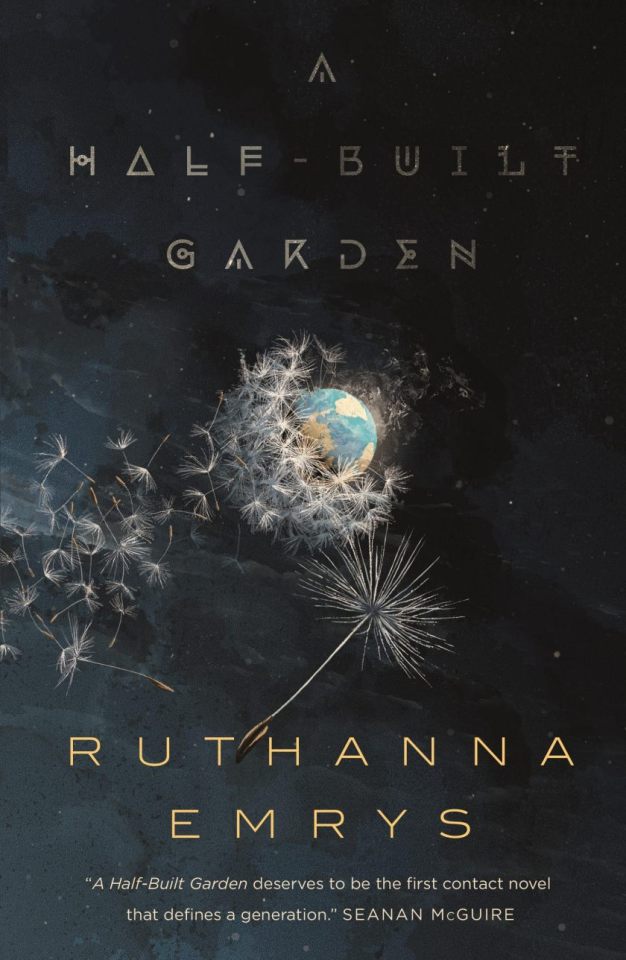
VII. A Half-Built Garden by Ruthanna Emrys
A spectacular first-contact novel about complicated utopias and networked conflict – it's a wild ride, where the protagonist is a perfect match for the world, where a century of incredibly hard, smart work has carried us through the climate emergency, to the point where it's possible to believe that, over time, we will stabilize our relationship with the only known planet in the known universe capable of sustaining our species.
https://pluralistic.net/2022/07/26/aislands/#dead-ringers

VIII. When Franny Stands Up by Eden Robins
Here's the McGuffin of this debut novel: The advent of World War II and the rise of woman comedians (filling in the vacuum left by the departure of all the men) reveals the existence of Showstoppers: involuntary psychic reactions that woman comedians can induce in female audience members when they're really cooking. A book that feels simultaneously utterly contemporary and like an old, beloved classic.
https://pluralistic.net/2022/11/01/eden-robins/#alt-history-comedy
Next up: Kids books!
https://mostlysignssomeportents.tumblr.com/post/702452328987508736/all-the-books-i-reviewed-in-2022-part-ii-books
Image:
Matthew Petroff
https://commons.wikimedia.org/wiki/File:George-peabody-library.jpg
CC BY-SA 3.0
https://creativecommons.org/licenses/by-sa/3.0/deed.en
[Image ID: Interior of the George Peabody Library in Baltimore.]
20 notes
·
View notes
Text
Ok, after dropping the outline post about character design for my Final Fantasy 8 inspired TTRPG setting here, I think the next step to keep my focus up is to finish one detailed write-up of a Regiment (minus mechanics, which are still being tested) and post it each day.
First up is the Adept Regiment, for dreamers and artists who have a greater intuitive aptitude for magic than other students, but who sometimes lag behind in the acquisition of mundane skills.
THE ADEPT
Magus (Archaic), Dreamer (Informal), Hag (Derogatory)
You were always creatively gifted, whether this manifest through art, music, poetry, or simply a penchant for vivid daydreaming. Now that you are awakened to the potential of magic, you have found that its flow through your conscious mind is both familiar and comfortable, as if by cultivating your imagination you have already shaped your spirit into an apt vessel for supernatural power. Many who develop the potential to become Adepts manifest their Personal Aeon at an earlier age than is typical for other Regiments, and advance even further with their magic due to this head-start in growing accustomed to its presence in their lives.
You lean on instinct to control magic just as much as learned technique, and probably favor your supernatural gifts more than your weapon training in combat. You master complex enchantments with a casual ease that makes you the envy of your peers, but you may sometimes have difficulty drawing your thoughts down from the abstract and giving attention to practical concerns. In other words, your head is often lost in the clouds, and your leaders know to pair you with someone more grounded who can help you maintain focus.
The Aeons of Adepts often look as though they were drawn or painted in a style favored by the Adept’s creative works, or their manifestation is accompanied by the presence of the Adept’s current passion in music or spoken verse. More than any other Regiment, the Aeons of Adepts tend to change over time to reflect the development of their host’s aesthetic preferences, both in terms of appearance and personality. Adepts are the Regiment most likely to see their Aeon as a discrete entity from themselves, a boon companion rather than a quasi-autonomous aspect of their soul, and to take the arduous steps necessary to anchor their Aeon permanently to the world so that it won't fade as they age. This practice is officially discouraged by the Regiment because doing so severs the Adept's ability to use magic directly, but unofficially an Adept who decides to do so will find only token opposition from their peers, and a great deal of back-channel support in arranging for the proper spells and ritual components to fall into their hands.
The Adept Regiment as a whole describes itself as a meritocracy, but has idiosyncratic ideas about what constitutes 'merit'. Broadly speaking the more magical power an individual has accumulated, the more weight their opinions are given. However, magical power is a difficult thing to precisely quantify, so Regiment gatherings are often punctuated by non-violent but no less intense ritual contests to establish the current pecking order... and a handful of outright Duels that are usually more about settling personal grudges than anything else. Even these rarely lead to serious injury though, since Adepts prefer to clash their Aeons against one another rather than brawl things out with their own flesh the way more physically inclined regiments like the Stalwarts and Errants so often do. Additionally, since creative achievement is also so valued by this Regiment, an Adept who lacks standing as an experienced enchanter may be able to disseminate their opinions by presenting them skillfully through their chosen medium. Adept gatherings tend to be just as much about exhibiting one's latest works as they are about discussing whatever larger matter concerns the Regiment as a whole.
REGIMENTAL AEON: The Cygnet Sorceress plummets from above like a shooting star, spreading her wings at the last moment to arrest her fall and gliding gracefully to alight in a field of wildflowers that blooms just in time to meet her footsteps. She is a beautiful woman with dark hair and joyful eyes wearing cerulean robes, with the angelic white wings of a swan. Beneath her robes her ribcage is open, and her beating heart is exposed. It is said that in life a Witch took her body from her, and though she reclaimed it with the help of her friends the emotional trauma never fully healed. Many believe that this wound is symbolic of that, and that the ring shaped like a lion’s head that hangs from a chain around her neck to rest against her heart is a token of the particularly beloved individual who lead the charge to save her. A loyal hound made of darkness and starlight follows at her heels, and sometimes he becomes a razor-edged wheel that she throws, that always returns to her. But she rarely uses this weapon, and prefers to cast the most puissant of magics instead.
BLESSING - MUSE’S INSIGHT: On some level all creative works are about shaping emotion, and the first gift of the Cygnet Sorceress allows Adepts to sense the emotional state in others to a heightened degree. Of course, they may not know what to do with that awareness once they have it. An especially sensitive Adept may even use this ability to detect incorporeal spirits, provided the spirit can first be provoked into feeling an emotion strong enough to pierce the veil.
BLESSING - FAMILIAR FRIEND: The Adept can manifest a spirit in the form of a mundane animal, typically no larger than a dog, although undersize or immature versions of larger creatures are possible. The Familiar will be extraordinarily intelligent, unfailingly loyal, and capable of understanding the Adept’s speech, as well as the speech of anyone else who speaks a language known by the Adept. Other than those differences, it will still only have the physical capabilities of a mundane animal of its species. For some Adepts this is the soul of a beloved pet that they’ve bound to themselves past its mortal lifespan, for others this is a construct of pure imagination, and for a rare few the Familiar is an alternate form that their Personal Aeon takes rather than retreating inside of their soul when out of use.
CURSE: Every Adept wants to be admired and respected for their gifts, and nothing stings them more than seeing someone else demonstrate an aptitude the Adept wishes they possessed, but do not. Being confronted by such a personal shortcoming may cause the Adept to retreat into a fantasy scenario where they imagine a world where they are a virtuoso at the desired skill.
ATTRIBUTES: Analysis, Resolve
FAVORED ARTS: Restoration - the Art of Healing, Rhapsody - the Art of Inspiration (Regiment Exclusive), Rituals - the Art of Sorcery
2 notes
·
View notes
Text
Part 2 of my series on fantasy classics is live on my Patreon!
Here's a free preview, about how every generation rediscovers WH Hodgson's The Night Land and goes "oh man, this is *almost perfect*, I bet if I just rewrote it a liiiittle bit it'd be GREAT"
Because I spend a lot of time alone and have spent a lot of my life alienated and isolated, I tend to think of archive diving and recovering the past in terms of individual enrichment. I almost forget sometimes that there might be an audience for this stuff, that anyone could possibly care. Sometimes though I connect another person to some aspect of their own relationships and history. Making some connection with a friend, and her family and history, and the history of this game that influenced so many of us, and so on, that's valuable insofar as our relationships with other people are valuable.
And sometimes it can be individually enriching in unexpected ways. Like, in reading over these articles again I made a very funny discovery: everyone has the same reaction I had to The Night Land, William Hope Hodgson's post-Eldritch Apocalypse epic. Specifically, a host of writers and editors down the ages have looked at this book and thought, "oh man this is [sucks teeth] this is almost so good, if I could just... tweak it a little bit...".
In fact, a lot of the article on The Night Land is devoted to a rather crabbish defense of Hodgson's weirder writing choices, choices leading to sentences like, "And some shall read and say this was not, and some shall dispute with them; but to them all I say naught, save "Read!" And having read that which I set down, then shall one and all have looked towards Eternity with me -- aye, unto its very portals. And so to my telling." Chewy stuff. Stuff that apparently even HP Lovecraft found a bit much, which seems to exasperate Rateliff to no end given Lovecraft's "own bizarre idiosyncratic vocabulary (including "eldritch," "squamous," and "rugose," to name only a few, occasionally with New England rural dialect and 18th century orthography thrown in)".
Moreover both Lovecraft and of all people CS Lewis criticize the story for its central narrative: a love story. The Night Land is the story of a couple of lovers (maybe from the Tudor era, Rateliff speculates), separated tragically by death, but granted the possibility of reunion in the protagonist's vision of a distant future. In that future, the sun has been snuffed and the land teams with all manner of horrors. It is, Rateliff succinctly suggests, a vision of the future only hinted at in Lovecraft's Cthulhu Mythos, one where the Elder Gods plunge the world into nightmare. The last remnants of humanity huddle in two great pyramid redoubts. Our protagonist is reincarnated into one pyramid... and his lover is reincarnated into the other. When the other pyramid is breached by the horrors of the night, he has to brave the dark and its terrors to reach her.
I think this hook is electrifyingly brilliant. CS Lewis dismisses it as a "sentimental and irrelevant erotic interest". Well, can't please 'em all. Or any of them in fact. Everyone seems to have some complaint about the Night Land, and apparently editor and writer Lin Carter even published a version that cuts about a tenth of the book--mostly, romantic elements. Hodgson himself put together an excerpted novella--The Story of X--that purported to be fragments discovered of a lost longer narrative, a sort of Night Land The Abridged Series. And then there's all the people since who've written their own versions of The Night Land or short stories set in The Night Land. Heck, when I was part of the large scale fan project The Magic Expanded Multiverse, one of the other writers on the project created an entire dying world based on The Night Land. People are just drawn to this book like, well, abhumans to the last redoubt of humanity, I guess.
Which is all intensely funny to me because a few years back I did the same exact thing. I started reading The Night Land and the further in I got, the more convinced I became that if you could just, if you could just make it so every single paragraph didn't start with "And", so every verb wasn't constructed like "I not to have slept" and "the hour did be full come", so that it read a bit more like his other novels like the brilliant Boats of the Glenn Carrig... it could just be so good!
I did not last long on my epic quest to rewrite The Night Land. Most of that was because I was crashing out of Toronto with a chronic pain condition and a boatload of trauma, but I also just couldn't quite make the project work in my own head. Eventually I found myself coming back around to Rateliff's position: the archaic writing is there because that's how Hodgson wanted to tell the story; to strip it out is to simply produce a new work, and you might as well just... do that, and take or leave The Night Land as is.
Apparently, though, the temptation will always be there for each new generation of writers to rewrite The Night Land.
Read More On Patreon
#classic lit#the night land#elden ring#the worm ouroboros#classic fantasy#lit crit#dungeons & dragons
2 notes
·
View notes
Text
Homebrew NPC: Mysterious Junk Peddler
Pssst. You wanna buy a sundial?
One of my absolute favourite tropes in fantasy is the mysterious shop or peddler that wanders into the story with a bag, cart, or building full of strange, magical and potentially cursed wares, makes some deals or sells some items, and then promptly vanishes again. The little shop that wasn’t there yesterday and won’t be there tomorrow, the junk peddler or lightning-rod salesman that appears at a crossroads just when the protagonist needs or wants something. And it’s all junk, or it all looks like junk, but it all looks weird and fascinating too, and there’s the odd piece of something very magical or worldshaking in there. Or maybe just something very personal, that this random stranger should never have been able to get a hold of …
And then you think about all of D&D’s myriad magic items, especially the low-level ones that are cool and interesting but maybe not entirely useful. Or you have a read of things like the Trinkets Table from the PHB, and all the strange and mysterious and curiously specific objects that all clearly have a story behind them. And maybe you picture a peddler, a strange and unusual sort of person, just … wandering up to the party and maybe giving them a bit of a browse. Through some junk, some mildly interesting magical bric-a-brac, possibly some quest hooks … and maybe, once in a blue moon, something a bit more powerful. A diamond in the rough.
And maybe, on occasion, the peddler might have their own secrets. Maybe they’re the devil in disguise. Or a fey. Or a dragon. Or someone’s long-lost parent or sibling. You never know.
So. Have some options for creating a wandering magical junk salesperson for your players to encounter:
Peddler’s Appearance
d6 Appearance
1 A scrawny human in a ridiculously oversized ragged overcoat who shiftily produces their wares from various pockets of said overcoat.
2 A flamboyant elf in pink and gold who produces each item with a flourish from a golden knapsack, as though waiting for applause each time.
3 A grinning, gap-toothed gnome who plucks their wares one by one from apparent thin air, wiggling their fingers gleefully.
4 A dwarf the approximate size, shape and colour of a small boulder, who dourly pulls their items from a brown duffle bag the same height as they are.
5 A serene tortle who makes a production of pulling first a broad yellow blanket to sit on, then a tea set, before finally their wares, from their shell.
6 A stern-faced dragonborn who lays out their wares on a little wooden trestle table as though they’re laying down the final hand in a high-stakes card game, glaring the whole time.
The peddler has roughly 10 to 11 items on them at any time, in the following proportions:
Peddler’s Wares
Amount Wares
5 Various strange items and junk. Roll five times on the Trinkets table in the PHB, or choose your favourites for flavour or as plot hooks.
3 Common magic items.
2 Uncommon magic items.
1 (optional) Item of any rarity above uncommon, from rare to legendary.
The caveat is, the peddler (apparently) has absolutely no idea what any of their wares are, and is therefore wildly idiosyncratic in their pricing. They will demand outrageous prices for apparent junk, yet happily accept 100 gold for valuable magical items. They fancy themselves a fine salesperson, so are willing and eager to haggle, and may accept trade in kind from players with interesting items to put on the table (‘interesting’ need not mean ‘valuable’ either). They cannot describe their wares to their customers beyond physical appearances and any other impressions they may have gained from the items. If asked where they acquired their wares, they may variously demure, prevaricate, or give wild and fantastical tales of adventure and skullduggery (DM’s choice).
And perhaps the peddler might secretly be more than they appear. If you’d like them to be of story importance, roll on the table below, choose your favourite, or come up with your own campaign-appropriate secret:
Peddler’s Secret
d6 Secret
1 The peddler is a gold dragon in disguise, trying to steer the party gently in a certain direction, or to empower them for trials it knows they’re soon to face. This peddler may hint as to items’ true natures more strongly, and might have a very powerful item that they’re willing to part with for astonishingly cheap.
2 The peddler is an archfey or copper dragon or a trickster god, sowing seeds of magic and chaos across the world, mostly for fun and its own amusement. This peddler will keep absolutely mum or playfully mislead buyers, and might have some of the more fun-but-questionably-useful items.
3 The peddler is a hag or fiend in disguise, spreading small evils and horrors, or creating a false sense of security in its customers. This peddler might have more spooky or cursed items among their wares.
4 The peddler is an undercover archmage or lich, selling some of their random magical junk while secretly trying to steer adventurers towards a dungeon or object they’re interested in. This peddler may have a map or rumour of a nearby location to investigate.
5 The peddler is someone a member of the party thought long dead or vanished, trying to watch over them from afar. This peddler might have an object a party member recognises among their trinkets.
6 The peddler is a member of a cult, trying to spread tainted objects that carry the mental influence of their patron out into the world. This peddler might have quite useful items, but will always do their best to also get the party to purchase some innocuous-but-tainted object, or perhaps have odd prices and give the party ‘change’ in strange, tarnished coins.
(If anyone recognised the influences of Disney’s Aladdin, Disney’s Hercules, Something Wicked This Way Comes, Needful Things, pretty much every devil-disguised-as-a-saleperson story, and, randomly, Seraphim Falls, in this, congratulations! I love this trope …)
51 notes
·
View notes
Text
Favorite Books 2021
I read 121 books this year. (I’m in two book clubs and this is my main form of entertainment. Don’t imagine that I’m also keeping up with popular TV series or podcasts or playing plotty video games.)
Anyway, I wanted to share my favorites and ones I would recommend. The order is the order I happened to read them in over the year.
First, favorites:
The Fade by Chris Wooding: A favorite because of the unique, alien setting (complete alternate planet) for a political intrigue plot. Main character is a female assassin who is actually old enough to be the best at her profession.
Ninefox Gambit by Yoon Ha Lee: A favorite because the artificially immortal, possibly insane (but then who can say in a such a corrupt system?) General Jedao is the exact (like UNCANNILY EXACT) kind of character I go for. Big sci-fi empire, you will have to roll with the setting, but you don’t actually need to know math to get the plot.
Piranesi by Susanna Clarke: A favorite because it’s short, sweet, surreal, and troubling. A what-if of a book that lingers. A man is in an endless network of hallways and galleries of statues, and eventually figures out more about how he got there.
Spinning Silver by Naomi Novik: A favorite because sometimes you want a fairy-tale situation and you want an author who you can feel confident in.
Uzumaki by Junji Ito: A favorite because it was just so wonderfully disturbing. Now I notice spirals so much more.
The Book of Dragons ed. Jonathan Strahan: A favorite because I love dragons and this anthology had a wide variety and I enjoyed the large majority of the works in it.
The Monster of Elendhaven by Jennifer Giesbrecht: A favorite because of the absolutely awful (morals and personality) main characters and the gay eroticism of their horribleness to each other. Yes, it’s in the text. Cannot recommend this highly enough.
The Starless Sea by Erin Morgenstern: A favorite because it’s a story about stories, and okay, it is a little more vibe than story at times (or maybe I’m just dumb), but that’s not like…a bad thing.
The Unspoken Name by AK Larkwood: A favorite because it’s got all kinds of stuff I like in it! Alternate worlds, shady immortals, dead* gods*, looking for a macguffin and finding love instead!
The Fifth Season by NK Jemison: A favorite because I was immediately drawn into the world, the characters, everything, I want to know more and more and more about the mystery of this world and how the characters are going to deal with it ending (not a spoiler). So good I feel like I need to gnaw on something, IDK.
Honor Lost by Rachel Caine and Anne Aguirre: This is the last book of a trilogy and I recommend the whole thing. It’s a fun YA space opera, and it takes a lot for me to enjoy YA these days. I will say that you have to just kind of roll with the space travel component (it makes no sense given the scale of space and no standard FTL travel or gates/hyperspace etc.). But I’ve never read a regular published book where the development of an interspecies polyamorous relationship is the heart of the series.
A Big Ship at the Edge of the Universe by Alex White: Space adventure, science fiction setting with magic woven into that society. High stakes treasure hunt.
A Desolation Called Peace by Arkady Martine: Sequel to A Memory Called Empire. All the complicated questions about empire from the first book, but now with a developing war and first contact situation with really alien aliens.
*
More recommendations! Why not favorites? The answer is that there was some aspect that I recognize is something very idiosyncratic about myself that puts them not on my personal favorites list but I still think they’re very good.
The Brilliant Death by Amy Capetta: YA set in fantasy Italy, magic of a type I haven’t seen before, and much more playing around with gender than I’ve seen in almost any fantasy novel.
The First Sister by Linden Lewis: The first book of a series, yes it’s more space empire rebellion and intrigue, I plan to continue with the next book.
Black Sun by Rebecca Roanhorse: The more I think about this one the more eager I am to read the sequel (April 2022 last I heard). Set in a pre/non-Columbian South and Central American world. A suppressed religion’s chosen one does what he’s chosen for.
Nimona by Noelle Stevenson: This graphic novel is fairly well known, I would guess, among anyone who’s likely to see this post. Main character shapeshifter, nemeses and questions of heroism and villainy.
Mexican Gothic by Silvia Moreno-Garcia: Definitely both very gothic and Mexican. Got that unsettling claustrophobia of the gothic house to a very strong degree.
The Sundial by Shirley Jackson: Horrifying but also dark, dark humor. Maybe it’s the end of the world, but if only the main characters in the book are going to live through it, who’d want to go on? Jackson’s writing always makes me want to shriek; she makes it look so easy to do it well.
The Invisible Life of Addie LaRue by V E Schwab: A young woman makes a deal to live forever, but to never be remembered. Three hundred years later, that changes.
The Cipher by Kathe Koja: Two people find an impossible, inexplicable, completely black hole in an apartment building storage room. And it gets worse and more horrifying from there. I highly recommend this one because it is so horrifying and weird, but I also found it difficult to read because it’s in first person and the narrator is a depressed bastard. There’s no clearer way to say it, and I found it hard to deal with being in such a character’s head sometimes.
Nightbreed by Clive Barker: Recommended because I enjoy horrifying and weird things, and the metaphor in this 90s comic series just hit me hard. The haven of the Nightbreed gets destroyed, and now the monsters have to deal with the aftermath and search for a new refuge. The metaphor’s very obvious when you read it but it’s still a metaphor so if that puts a bug up your ass don’t say I didn’t warn you.
The Beast’s Heart by Leife Shallcross: A Beauty and the Beast story from the perspective of the Beast. Clear links, narrative-wise, to Beauty by Robin McKinley, though not directly related (I’ve just read a lot of Beauty and the Beast stories and it’s sometimes easy to spot particular influences). Kind of angsty (not a huge surprise given the premise) but if you’re interested in this premise this book does it well.
*
I will not be providing any identity list for the characters in these books beyond what I’ve already mentioned in my brief notes, because I find that trend tiresome and uninformative when I’m deciding what to read. BUT! I am willing to talk more about any of these if you’re interested. Anyway, remember that I’m just a random person that a few of you know and most of you don’t, I just read 121 books this year.
9 notes
·
View notes
Note
Hellooo!! Im super glad a hetalia blog exists in 2020💞💞💞💞💞. May i request 2p america and canada having a s/o that like a mythical figure of some sort? Could be a demigod or anything really but they are physically stronger than them and there is no way to control his s/os form since they exist in forms beyond the description/mental capacity a human can handle. Like if they want to be at the beach the *poof* they transported away and not even chains can stop em🧜♀️
This is an ask that I certainly didn’t expect landing in my inbox. Jep, active hetalia blogs in 2020 are a rarity, however, I think with a new season and new manga issues on the horizon, that a hetalia renaissance is coming.
Yandere Hetalia
2p America

Now, Allen isn’t the sort of man that takes it well when things don’t go his way. In all his fantasies and hopeless whims, he has created a world where everything goes according to his master plan. He’d like the actual world to be dictated by this. Alas (or rather, thank goodness), reality is different. That means when you would show your powers and successfully escape from him, there would either be a nervous breakdown or a temper tantrum.
The food tray fell to the floor in a loud clatter, causing ceramic to shatter, sauce to platter over the grey floor and a few peas to zip under a cupboard. Allen’s jaw went slack, granting him one of the most idiotic expression in the history of the human race ever since the English managed to sink the Spanish Armanda.
In the middle of the room, where you were supposed to be tied up on a cushy chair, all delightfully arranged for his eyes to feast on, was just a chair with a tidy heap of rope lying next to it. You where no where to be found – not a drop of blood, not a single strand of hair, not a single footprint in the thick layer of dust that covered most of the room.
Without wasting much energy on trivial things such as complex thought, he lunged forward and grappled with the binds as if they could deliver some answers. They didn’t; they just posed more questions.
The course hemp ropes were still completely undamaged, the sailor knots untampered and still immaculate. Now that Allen had the chance, he granted the setting a closer look. The only footprints in the dust and dirt were those of his large feet. The frustration the situation concocted made something in his mind short circuit.
Quickly, Allen raced back to his dingy little kitchen, cursing under his breath all the way there. Some sort of impulse drew him to the one window – maybe it was fate, maybe it was his gut instinct that told him to do so – only to spot you on the street five stories down, staring to the window expectantly.
Hurriedly, he fumbled with the latches, spitting vitriol when he couldn’t get it open fast enough.
He wanted to shout at you, yell that you should move your sorry ass up at once, that he deserved an explanation. Yet, you beat him to it. With a flamboyant gesture, you waved up at him, doing your best to highlight your astounding clean appearance and then shouted up at him:
“Adios, sucker!”
The scream of “(Y/n), you fucking bitch”, that followed could have woken up the dead.
He would never manage to fully calm himself down from the stunt you pulled and in his anger he wouldn’t properly register that you demonstrated your powers to him. Allen would constantly write the strange circumstances surrounding your escape as some form of trickery, or that you had outside help, or… That list goes on and on, just never lands my magic for being the key.
It would be through detours that it would the idea of you having supernatural powers would start to encroach on him. Being the street smarts person, he’d do his best to predict your next move based on his social experience and go ahead to interrogate the people that once belonged to your close circle. First, he would observe them to see if they were hiding you and if not, then he’d disguise himself as an authority person or as a family member of yours and ask some question. Thanks to that, he would piece together that you are out of the ordinary.
2p Canada

Like his brother, he would be pretty pissed that you would somehow always manage to escape his clutches. Unlike his brother, Mark’s anger would be of the ice-cold variant, helping him focus rather than hindering him in his endeavour to capture you and capture your heart.
He is a hunter and would opt to observe you like he would a deer before he would dispatch it. Through that, he would discover your demigod status. Although, he wouldn’t believe his eyes the first time he would witness your powers in action. It would cause him go ahead and put you on heavy surveillance, and maybe for him to also go and see a psychologist to ensure that he isn’t schizophrenic.
Once he’d be sure that what he saw, he’d go on to investigate, because he’d yearn to much for you to simply let you go because you’d have some trump cards that would give you the high ground. As the rules of the divine dictate, there are certain laws that you have to abide to, specific lines that you can’t cross, weaknesses that ensure that you’re not invulnerable. And Mark would set out to identify them all.
This would be one of the rare cases where he would bury himself in books, and once he would suffer from a headache induced by the vagueness of the texts and the craggy language, he’d even dare to ask Oliver for help. Whether it would be silver that would make you weak, certain chants that could summon you or a geas that would represent an idiosyncratic tripping line, he would somehow find out and incorporate it in his plan to capture you and ensure that you’d forever be his.
(For clarification: A geas is taboo that an individual of divine linage is bound by. Breaking this taboo means that said person becomes mortal, vulnerable and only has a short time to live before the reaper comes to spirit them away. The worst part about it, is that the geas usual forbids something really minor or trivial, like that you may never eat chicken or else you die.)
68 notes
·
View notes
Note
Hi!! Can we hear more about the regency fae story?? It sounds really cool!
Of course!
In a way it was inspired by Pride and Prejudice and Zombies (the movie version) and its juxtaposition of the stifling social rules of the period with an actual life or death conflict looming ever-present over their heads. I find faeries more interesting than zombies in general, and way more suited to the Regency setting in specific, because it's not just a matter of combat-readiness and "remove the head or destroy the brain" and "be aware of the danger of being bitten." Faerie lore tends more to complex, idiosyncratic and Very Important rules that Absolutely Must Be Followed on pain of unpleasant consequences (don't eat faerie food, don't say "thank you," don't give them your name, etc), which has a lot in common with the stilted and restrictive rules of etiquette for the upper classes of the period.
The general concept is a fantasy version of Regency England where Faerie exists alongside the human world - mostly unseen, unpredictable and unknowable but definitely capable of affecting humans. Everybody knows about it but nobody talks about it openly because getting the attention of the fae is never a good idea.
These are old-school faeries, the ones people call "the Fair Folk" in the same way the ancient Greeks called the Furies "the Kindly Ones," not because they're beautiful necessarily but because the last thing you want to do is offend them. They don't think like humans, and they certainly don't act according to any kind of recognizable human morality. People unfortunate enough to be taken away to Faerie come back altered, if they come back at all, and even smaller forms of fae influence tend to be unnerving at best, and often as not much worse than unnerving.
So... people develop all these social rules and rituals to try to guard against coming under Their influence. Rules like "people must be introduced to one another by a mutual acquaintance (who can vouch for them as humans and not some random fae pretending to be human)" and rules about who can be alone together (the better to guard against faerie abductions) and all these other formal rituals of human interaction. Being known as fae-touched is a social kiss of death; being rumored to have fae blood is even worse.
And of course little to none of this is verifiable, concrete fact; it's all folk wisdom and stuff that's been trial-and-errored based on observations of what seems to have been effective in the past, and some of it is outright bullshit that's gained a varnish of apparent truth via time and repetition. The very rich and powerful, regardless, can afford more practical protections such as magic, and have a little more leeway as a result.
What I'll actually do with this setting, I haven't quite decided. One option is to use it for a whole-ass Pride and Prejudice retelling as per yesterday's post, which is a big complicated undertaking but could be interesting.
The other possibility is to draw inspiration from Pride and Prejudice and other Regency fiction and then do my own thing with it, which allows much more freedom with the plot but also obligates me to... come up with a plot. Probably something involving trying to rescue a sibling who's been abducted to Faerie. I'm still chewing on it.
8 notes
·
View notes
Text
What Makes a Work “Fannish” for Me?
So there’s been some well-need pushback against the idea that fandom-inclined people are “ignoring” quality media, or media with more unique premises/plotlines, more explicit canonical queerness, etc. This post, in particular, points out that people, in their fandom activity, tend to gravitate towards more “fandom viable” works, but that their taste could very well stretch beyond that. I agree with the general sentiment, but it got me interested in poking at what, exactly, constitutes “fandom viable.” My own fannish history is perhaps a little idiosyncratic, and my tastes are individual, so I can’t claim to speak for everyone here, but I did isolate certain aspects of a work that make me personally more inclined to write fic about it, read fic about it, extensively headcanon about it, write meta about it*, etc.
*My analysis brain is rarely turned off, but churning out actual quality longform analyses or interpretations, as opposed to condensed observations, take brain power that I don’t want to devote to everything I watch.
Here’s the reasons I could come up:
There has to be a semi-substantial fandom in place already. I won’t be prompted to think extensively and fannishly about something if the infrastructure to do so isn’t in place already!
By extension, there has to be a lot of Lore in the work or its worldbuilding to pick apart and analyze, or at least a lot of interpretative potential to its characters and relationships. I first got drawn to online fandom for meta, and that still exerts a powerful pull in me in terms of whether or not I want to engage with a fandom (even in fanfiction-related ways).
There has to be something porous about it, some sort of empty space I can crawl into. I’ve seen people cite the work in question letting them down as a motivation to participate in fandom, because they want to write or read fix-fic. That’s not quite what I’m getting at here, or not necessarily - sometimes the work in question works completely well and feels perfectly realized as its own story, but still leaves lots of potential to expand it beyond the bounds of its structure. The Silmarillion, for instance, is very broad strokes in its narrative, which works for its aims considering it’s meant to be an historical/mythological account (with various in-universe framing devices). But the extent to which important events, character interactions, and eras are glossed over leaves open lots of room for a fan to hone in on a particular element of the story and magnify it. The story as it functions purely on its own level is the appeal for me as a reader; the ambiguity and expanse of space to imagine the relationships in any number of ways is the appeal for me as a fan.
There has to be a large cast. Gertrude Stein imagined theatre as analogous to a landscape painting in that it focused on group structures and relationships, and that’s the kind of approach I like to take to fanfic, and to building my own headcanon-universe. I often have my favourite characters, of course, but I’m not the kind of person who focuses exclusively on one character or ship. I’m drawn to networks of people whose lives rotate around and brush up against each other, and who offer a variety of permutations in interaction to play around with. A lot of the novels and stories I love don’t lend themselves to this, because they’re essentially a one-man show, with other characters existing to serve that one protagonist’s story. I need to have not necessarily multiple protagonists or POV characters, but multiple characters who are players in the game and whose perspectives, backstories, and interiority are at least hinted at. This is a big appeal of MDZS for me - it’s Wei Wuxian’s story, but there are numerous side characters who are given attention and whose personal relationships are important plot-wise or theme-wise.
There needs to be a fantasy element - more specifically, it needs to take place in a world not our own. (Whether or not Star Trek or the MCU could count as this is.... questionable). Obviously not everyone feels this way - see Hannibal, Sherlock, and countless other popular fandoms that are set in our world. But for me personally, I like to have some remove, and in fact feel rather uncomfortable at the prospect. The reasons for this are twofold. One is negative - I’ve never felt entirely comfortable with writing stories that take place in our world, especially with no magical or otherworldly aspect. It’s hard to say why this is, as my reading habits certainly don’t tend in that direction - I read and enjoy a lot of realistic fiction, and, while I enjoy SFF, I’m quite picky about it. (This is what we mean by “people fannish tastes don’t necessarily indicate their media tastes as a whole.”) But I find writing those kinds of stories stifling and hard to express my voice in, for some reason. The other reason is positive - I get a lot of active joy in cultural worldbuilding, in playing in fictional settings not my own. This is a big appeal of The Silmarillion, and why I’ve toyed with writing fic for Homestuck. I will say that I also like writing queer characters and relationships, and there’s no way I want to touch real world queer identity and politics. There’s an appeal to exploring issues like those through a funhouse mirror. Art lets us look at our reality a bit slantwise.
I’m sure there are other factors present for me, especially ones that are more minor or idiosyncratic, but those are the main ones for me. I’m curious to know what the draws for that particular kind of engagement are for other people!
22 notes
·
View notes
Text
RECS: Want to Watch Old Anime? Discotek Has You Covered
Every anime season brings a new roster of hits, but the shows of the past recede into the distance. Certainly, there are some exceptions and niche fans keep the spirit of ongoing series like Gundam alive. But with the continued emphasis on new and exciting anime, it’s tempting to forget the multitude of great shows and movies that already exist.
The Discotek label has fought consistently over the past several years to ensure that anime’s past is preserved. Run by industry stalwarts, they’ve done the impossible time and time again: they tracked down the masters of cult OVA Project A-Ko, painstakingly restored the 2001 remake of Cyborg 009: The Cyborg Soldier from thousands of damaged tapes, and much of their best stuff is now available for streaming.
If you’re looking for something a little different or simply looking for a new show to watch, why not travel back into anime’s past? Here are some great TV series and movies as enjoyable today as they were when they were produced.
These are just my own recommendations, picked from the great sea of Discotek titles. But if you want to explore further, and check out titles including real-life inspiration on Yoko Taro, Sister Princess, you can find their shared Crunchyroll catalog list here.
Note: The titles listed are largely only available in the United States and Canada.
Movie Night
Urusei Yatsura Movie 2: Beautiful Dreamer
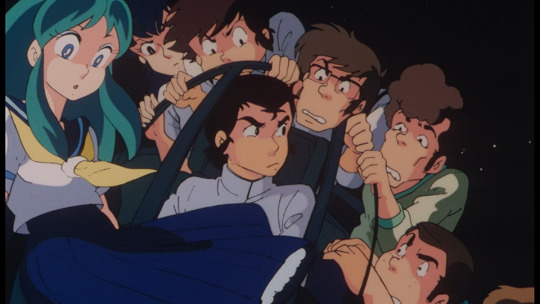
One of the best-known anime directors ever, Mamoru Oshii first made his mark with an outrageously popular animated sitcom: Urusei Yatsura, the series that put the queen of romantic comedy manga Rumiko Takahashi on the map. Oshii struck a balance throughout the TV series between hilarious comedy and experimentation, but it was in the second Urusei Yatsura film, Beautiful Dreamer, that he really went all out. This surreal time loop story keeps finding new ways to defy audience expectations throughout its runtime both as an atypical Urusei Yatsura tale as well as a sterling example of just how imaginative and ground-breaking the Urusei Yatsura anime could be at its best.
GoShogun: The Time Etranger

GoShogun: The Time Etranger is that classic anime standby: a film completely different in tone and content than the franchise that spawned it. Released four years after the original 1981 super robot series, The Time Etranger spends much of its runtime focused on the dreams and anxieties of sole female cast member Remy as she lies in a coma at the hospital. Examining “what happens after” a final super robot fight, it remains an enjoyable film with smarter writing than you’d expect. The Time Etranger is also a notable favorite of the great 80sanime Tumblr.
Night on the Galactic Railroad

Kenji Miyazawa’s novel Night on the Galactic Railroad might be best known to English-speaking audiences as a reference point for anime like Mawaru Penguindrum and Galaxy Express 999, but in truth, it’s one of the most beloved Japanese children’s stories ever written. An anime film adaptation was released in 1985, directed by the famed Gisaburo Sugii and scored by Yellow Magic Orchestra member Haruomi Hosono. Also, the characters are all drawn as cats! While slow-paced, it’s a strong adaptation that captures the charming and whimsical spirit of the original novel.
Other Discotek movie recommendations:
All the other 6 Urusei Yatsura movies
Jin Roh
Like the Clouds, Like the Wind
Ringing Bell
Mecha
Giant Gorg
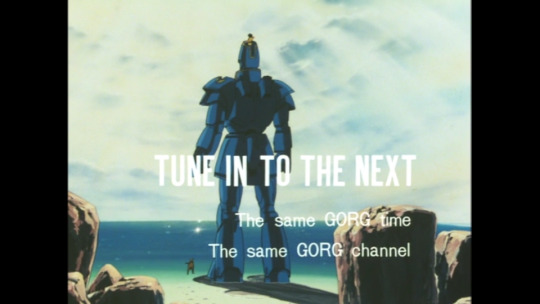
Folks talk up director Yoshiyuki Tomino as the key creative force behind the original Gundam. But don’t forget Yoshikazu Yasuhiko, the talented character designer behind both Mobile Suit Gundam and Zeta Gundam. His most personal anime project is Giant Gorg, the story of a young boy who stumbles across a giant robot on a mysterious island. Rather than a Gundam-style war narrative, Giant Gorg is a proper adventure story in which the young cast spring from cliffhanger to cliffhanger. A white whale in American anime fandom for years, it was finally licensed for distribution in the United States in 2015. Don’t forget this fantastic mash-up between the Giant Gorg OP and the Perfect Strangers theme!
youtube
Mazinger Edition Z

In Mazinger Edition Z, cult-favorite director Yasuhiro Imagawa reimagines Go Nagai’s classic robot series to create a unified setting packed with pulpy thrills and conspiracies: The giant robot Mazinger has a past history involving the Greek god Zeus! The villain Baron Ashura is recontextualized as a deeply tragic villain with the best story arc in the series! We’re even given Tsubasa Nishikori, a Go Nagai staple who here becomes Imagawa’s best-written female character!
Mazinger Z is absolutely suffused with the spirit that made Imagawa’s earlier masterpiece Giant Robo so beloved and is an essential watch for any fan of that series. Not to mention that it ends with a cliffhanger brutal enough to make Go Nagai jealous.
Other Discotek mech recommendations:
Dai-Guard
Gunbuster 2
Tetsujin 28
Comedy
Cromartie High School
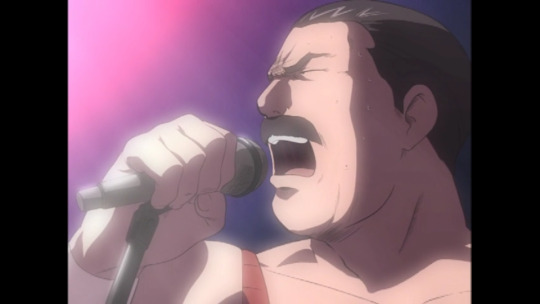
Anime comedies speak to the time that they were made, but there’s something uniquely timeless about Cromartie High School. You could say the show is funny because it’s set in a high school whose roster of delinquents includes a robot, Freddie Mercury, and a gorilla. But I think it goes even further than that: Cromartie High School is funny because its rowdy delinquents live lives just as boring as our own. When I watch Cromartie High School, I think not “what weirdos!” but “same, bro.” True in 2003, true in 2021.
Other Discotek comedy recommendations:
Bludgeoning Angel Dokuro-chan
Cat Girl Nuku Nuku
Golden Boy
Samurai Pizza Cats
Drama
Key the Metal Idol

Key the Metal Idol is a truly weird series. Directed and written by Hiroaki Sato, one of three animation directors who brought anime film masterpiece Akira to life, it’s the story of an android tasked by her creator to become human by making 30,000 friends. It’s a series that skewers the entertainment industry but is also loaded down with science fiction exposition. It’s a series that’s deeply in love with the work of David Lynch. Key the Metal Idol is flawed and idiosyncratic, but it’s also a genre-busting original far ahead of its time. And the opening credit sequence rules.
The Twelve Kingdoms
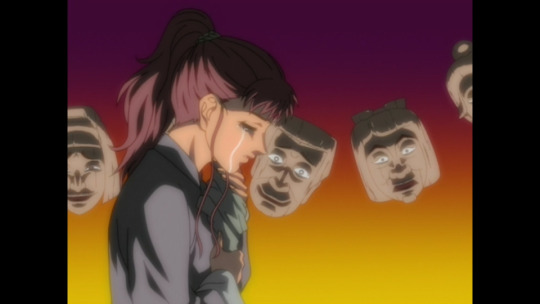
Fantasy anime are a dime a dozen these days, but for my money, no recent title comes close to The Twelve Kingdoms. The series has its share of magical creatures, epic duels, and even more elaborate fantasy worldbuilding than you can shake a sword at. But most of all, it’s a story about people and growth. Twelve Kingdoms puts its cast of scared teenagers in a crucible and subjects them to intense pressure until those teenagers realize, to their shock and genuine awe, that they can handle anything the world throws at them. Twelve Kingdoms deserves consideration along with Berserk as one of the greatest works of epic fantasy that animation has to offer.
Other Discotek drama recommendations:
Hajime no Ippo: The Fighting!
Honey and Clover
Kaiba
True Tears
What are your favorite older anime? Is there an anime BluRay or DVD you treasure most? Let us know in the comments!

Adam W is a Features Writer at Crunchyroll. When he is not evangelizing Kaiba to his friends and neighbors, he sporadically contributes with a loose group of friends to a blog called Isn't it Electrifying? You can find him on Twitter at:@wendeego
Do you love writing? Do you love anime? If you have an idea for a feature, pitch it to Crunchyroll Features!
By: Adam Wescott
10 notes
·
View notes
Text
Top 10 Games of 2019
This was an extremely good year for games. I don’t know if I played as many that will stick with me as I did last year, but the ones on the bottom half of this list in particular constitute some of my favorite games of the decade, and probably all-time. If I’ve got a gaming-related resolution for next year, it’s to put my playtime into supporting even smaller indie devs. My absolute favorite experiences in games this year came from seemingly out of nowhere games from teams I’ve previously never heard of before. That said, there are some big games coming up in spring I doubt I’ll be able to keep myself away from. Some quick notes/shoutouts before I get started:
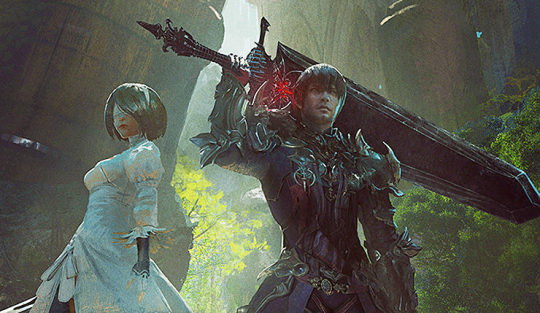
-The game I put maybe the most time into this year was Final Fantasy XIV: A Realm Reborn. I finally made the plunge into neverending FF MMO content, and I’m as happy as I am overwhelmed. This was a big year for the game, between the release of the Shadowbringers expansion and the Nier: Automata raid, and it very well may have made it onto my list if I had managed to actually get to any of it. At the time of this writing, though, I’ve only just finished 2015’s Heavensward, so I’ve got...a long way to go.
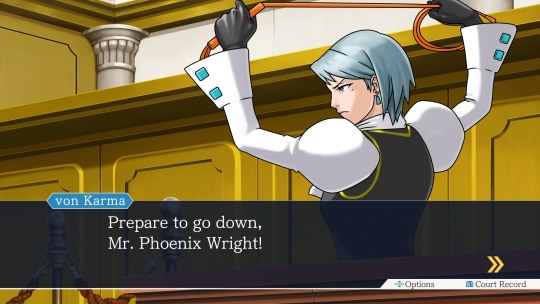
-One quick shoutout to the Phoenix Wright: Ace Attorney Trilogy that came out on Switch this year, a remaster of some DS classics I never played. An absolutely delightful visual novel series that I fell in love with throughout this year.
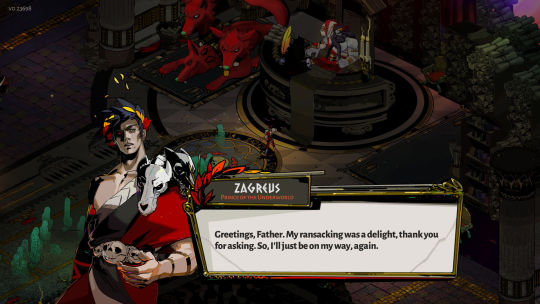

-I originally included a couple games currently in early access that I’ve enjoyed immensely. I removed them not because of arbitrary rules about what technically “came out” this year, but just to make room for some other games I liked, out of the assumption that I’ll still love these games in their 1.0 formats when they’re released next year to include them on my 2020 list. So shoutout to Hades, probably the best rogue-like/lite/whatever I’ve ever played, and Spin Rhythm XD, which reignited my love for rhythm games.
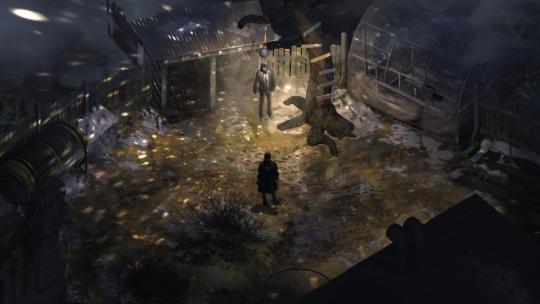
-Disco Elysium isn’t on this list, because I’ve played about an hour of it and haven’t yet been hooked by it. But I’ve heard enough about it to be convinced that it is 1000% a game for me and something I need to get to immediately. They shouted out Marx and Engels at the Game Awards! They look so cool! I want to be their friend! And hopefully, a few weeks from now, I’ll desperately want to redact this list to squeeze this game somewhere in here.
Alright, he’s the actual list:
10. Amid Evil
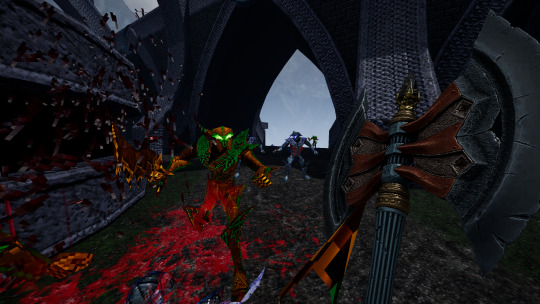
The 90’s FPS renaissance continues! As opposed to last year’s Dusk, a game I adored, this one takes its cues less from Quake and more from Heretic/Hexen, placing a greater emphasis on melee combat and magic-fuelled projectiles than more traditional weapons. Also, rather than that game’s intentionally ugly aesthetic, this one opts for graphics that at times feel lush, detailed, and pretty, while still probably mostly fitting the description of lo-fi. In fact, they just added RTX to the game, something I’m extremely curious to check out. This game continued to fuel my excitement about the possibilities of embracing out-of-style gameplay mechanics to discover new and fresh possibilities from a genre I’ve never been able to stop yearning for more of.
9. Ape Out
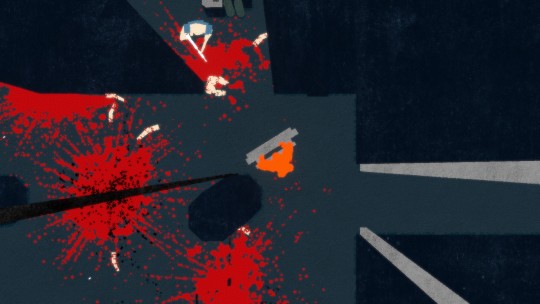
If this were a “coolest games” list, Ape Out would win it, easily. It’s a simple game whose mechanics don’t particularly evolve throughout the course of its handful of hours, but it leaves a hell of an impression with its minimalist cut-out graphics, stylish title cards, and percussive soundtrack. Smashing guards into each other and walls and causing them to shoot each other in a mad-dash for the exit is a fun as hell take on Hotline Miami-esque top down hyper violence, even if it’s a thin enough concept that it starts to feel a bit old before the end of the game.
8. Fire Emblem: Three Houses
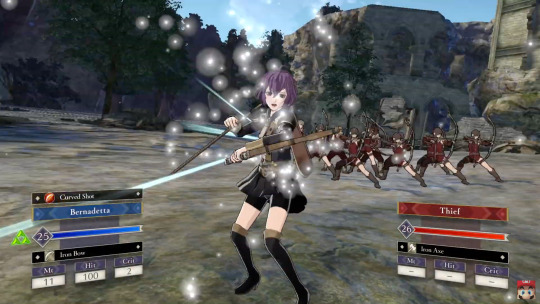
I had a lot of problems with this game, probably most stemming from just how damn long it is - I still haven’t finished my first, and likely only, playthrough. This length seems to have motivated the developers to make battles more simple and easy, and to be fair, I would get frustrated if I were getting stuck on individual battles if I couldn’t stop thinking about how much longer I have to go, but as it is, I’ve just found them to be mostly boring. This is particularly problematic for a game that seems to require you to play through it at least...three times to really get the full picture? I couldn’t help but admire everything this game got right, though, and that mostly comes down to building a massive cast of extremely well realized and likable characters whose complex relationships with each other and with the structures they pledge loyalty to fuels harrowing drama once the plot really sets into motion. There’s a reason no other game inspired such a deluge of memes and fan fiction and art into my Twitter feed this year. It’s an impressive feat to convince every player they’ve unquestionably picked the right house and defend their problem children till the bitter end. After the success of this game, I’d love to see what this team can do next with a narrower focus and a bigger budget.
7. Resident Evil 2
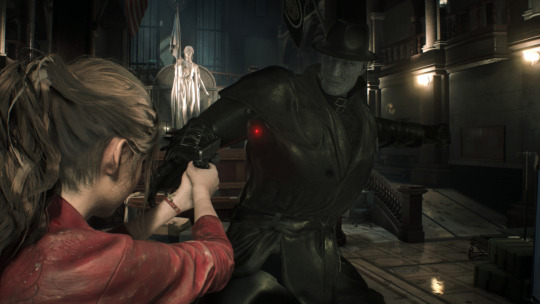
It’s been a long time since I played the original Resident Evil 2, but I still consider it to be one of my favorite games of all time. I was highly skeptical of this remake at first, holding my stubborn ground that changing the fixed camera to a RE4-style behind the back perspective would turn this game more into an action game and less of a survival horror game where feeling a lack of control is part of the experience. I was pleasantly surprised to find how much they were able to modernize this game while maintaining its original feel and atmosphere. The fumbly, drifting aim-down sights effectively sell the feeling of being a rookie scared out of your wits. Being chased by Mr. X is wildly anxiety-inducing. But even more surprisingly, perhaps the greatest upgrade this game received was its map, which does you the generous service of actually marking down automatically where puzzles and items are, which rooms you’ve yet to enter, which ones you’ve searched entirely, and which ones still have more to discover. Arguably, this disrupts the feeling of being lost in a labyrinthine space that the original inspired, but in practice, it’s a remarkably satisfying and addicting video game system to engage with.
6. Judgment
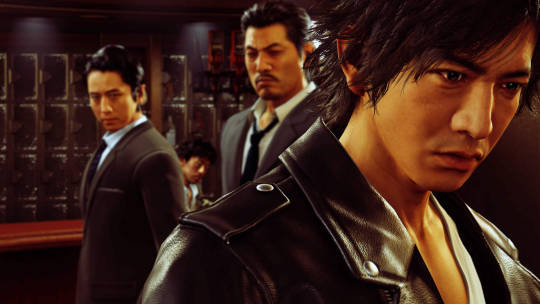
No big surprise here - Ryu ga Gotoku put out another Yakuza-style game set in Kamurocho, and once again, it’s sitting somewhere on my top 10. This time, they finally put Kazuma Kiryu’s story to bed and focused on a new protagonist, down on his luck lawyer-turned-detective Takayuki Yagami. The new direction doesn’t always pay off - the added mechanics of following and chasing suspects gets a bit tedious. The game makes up for it, though, by absolutely nailing a fun, engrossing J-Drama of a plot entirely divorced from the Yakuza lore. The narrative takes several head-spinning turns through its several dozen hours, and they all feel earned, with a fresh sense of focus. The side stories in this one do even more to make you feel connected to the community of Kamurocho by befriending people from across the neighborhood. I’d love to see this team take even bigger swings in the future - and from what I’ve seen from Yakuza 7, that seems exactly like what they’re doing - but even if this game shares maybe a bit too much DNA with its predecessors, it’s hard to complain when the writing and acting are this enjoyable.
5. Control
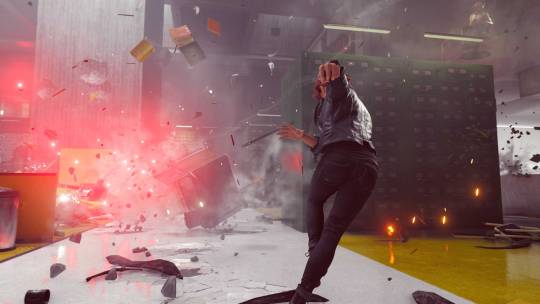
Control feels like the kind of game that almost never gets made anymore. It’s a AAA game that isn’t connected to any larger franchises and doesn’t demand your attention for longer than a dozen hours. It doesn’t shoehorn needless RPG or MMO mechanics into its third-person action game formula to hold your attention. It introduces a wildly clever idea, tells a concise story with it, and then its over. And there’s something so refreshing about all of that. The setting of The Oldest House has a lot to do with it. I think it stands toe-to-toe with Rapture or Black Mesa as an instantly iconic game world. Its aesthetic blend of paranormal horror and banal government bureaucracy gripped my inner X-Files fan instantly, and kept him satisfied not only with its central characters and mystery but with a generous bounty of redacted documents full of worldbuilding both spine-tingling and hilarious. More will undoubtedly come from this game, in the form of DLC and possibly even more, with the way it ties itself into other Remedy universes, and as much as I expect I will love it, the refreshing experience this base game offered me likely can’t be beat.
4. Anodyne 2
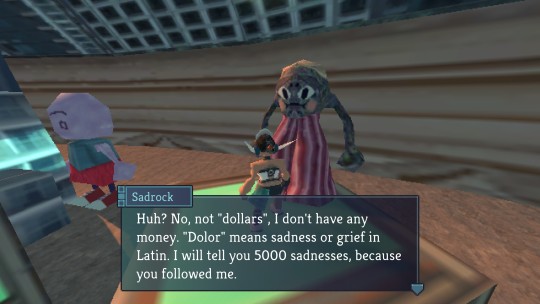
I awaited Sean Han Tani and Marina Kittaka’s new game more anxiously than almost any game that came out this year, despite never having played the first one, exclusively on my love for last year’s singular All Our Asias and the promise that this game would greatly expand on that one’s Saturn/PS1-esque early 3D graphics and personal, heartfelt storytelling. Not only was I not disappointed, I was regularly pleasantly surprised by the depth of narrative and themes the game navigates. This game takes the ‘legendary hero’ tropes of a Zelda game and flips them to tell a story about the importance of community and taking care of loved ones over duty to governments or organizations. The dungeons that similarly reflect a Link to the Past-era Zelda game reduce the maps to bite-sized, funny, clever designs that ask you to internalize unique mechanics that result in affecting conclusions. Plus, it’s gorgeously idiosyncratic in its blend of 3D and 2D environments and its pretty but off-kilter score. It’s hard to believe something this full and well realized came from two people.
3. Eliza
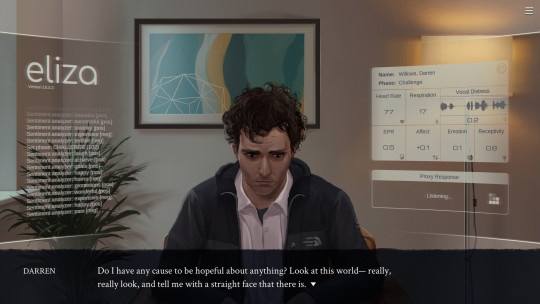
Eliza is a work of dystopian fiction so closely resembling the state of the world in 2019 it’s hard to even want to call it sci-fi. As a proxy for the Eliza app, you speak the words of an AI therapist that offers meager, generic suggestions as a catch-all for desperate people facing any number of the nightmares of our time. The first session you get is a man reckoning with the state the world is in - we’ve only got a few more years left to save ourselves from impending climate crisis, destructive development is rendering cities unlivable for anyone but the super-rich, and the people who hold all the power are just making it all worse. The only thing you offer to him is to use a meditation app and take some medication. It doesn’t take long for you to realize that this whole structure is much less about helping struggling people and more about mining personal data.
There’s much more to this story than the grim state of mental health under late capitalism, though. It’s revealed that Evelyn, the character you play as, has a much closer history with Eliza than initially evident. Throughout the game, she’ll reacquaint herself with old coworkers, including her two former bosses who have recently split and run different companies over their differing frightening visions for the future. The game offers a biting critique of the kind of tech company optimism that brings rich, eccentric men to believe they can solve the world’s problems within the hyper-capitalist structure they’ve thrived under, and how quickly this mindset gives way to techno-fascism. There’s also Evelyn’s former team member, Nora, who has quit the tech world in favor of being a DJ “activist,” and her current lead Rae, a compassionate person who genuinely believes in the power of Eliza to better people’s lives. The writing does an excellent job of justifying everyone’s points of view and highlighting the limits of their ideology without simplifying their sense of morality.
Why this game works so well isn’t just its willingness to stare in the face of uncomfortably relevant subject matter, but its ultimately empathetic message. It offers no simple solutions to the world’s problems, but also avoids falling into utter despair. Instead, it places measured but inspiring faith in the power of making small, meaningful impacts on the people around you, and simply trying to put some good into your world. It’s a game both terrifying and comforting in its frank conclusions.
2. Death Stranding
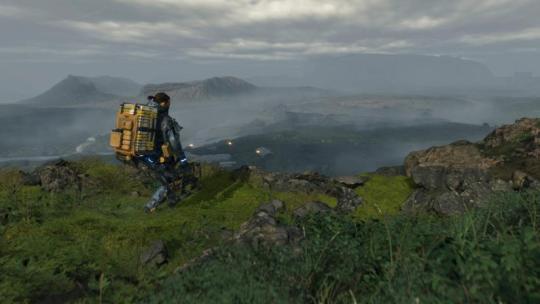
For a game as willfully dumb as this one often is - that, for example, insists on giving all of its characters with self-explanatory names long monologues about how they got that name - Death Stranding was one of the most thought provoking games I’ve played in a while. Outside of its indulgent, awkwardly paced narrative, the game offers plenty of reflection on the impact the internet has had on our lives. As Sam Porter Bridges, you’re hiking across a post-apocalyptic America, reconnecting isolated cities by delivering supplies, building infrastructure, and, probably most importantly, connecting them to the Chiral Network, an internet of sorts constructed of supernatural material of nebulous origin. Through this structure, the game offers surprisingly insightful commentary about the necessity for communication, cooperation, and genuine love and care within a community.
The lonely world you’re tasked to explore, and the way you’re given blips of encouragement within the solitude through the structures and “likes” you give and receive through the game’s asynchronous multiplayer system, offers some striking parallels for those of us particularly “online” people who feel simultaneous desperation for human contact and aversion to social pressures. I’ve heard the themes of this game described as “incoherent” due to the way it seems to view the internet both as a powerful tool to connect people and a means by which people become isolated and alienated, but are both of these statements not completely true to reality? The game simplifies some of its conclusions - Kojima seems particularly ignorant of America’s deep structural inequities and abuses that lead to a culture of isolation and alienation. And yet, the questions it asks are provocative enough that they compelled me to keep thinking about them far longer than the answers it offers.
Beyond the surprisingly rich thematic content, this game is mostly just a joy to play. Death Stranding builds kinetic drama out of the typically rote parts of games. Moving from point A to point B has become an increasingly tedious chore in the majority of AAA open world games, but this is a game built almost entirely out of moving from point A to point B, and it makes it thrilling. The simple act of walking down a hill while trying to balance a heavy load on your back and avoiding rocks and other obstacles fulfills the promise of the term ‘walking simulator’ in a far more interesting way than most games given that descriptor. The game consistently doles out new ways to navigate terrain, which peaked for me about two thirds of the way through the game when, after spending hours setting up a network of zip lines, a delivery offered me the opportunity to utilize the entire thing in a wildly satisfying journey from one end of the map to another. It was the gaming moment of the year.
1. Outer Wilds
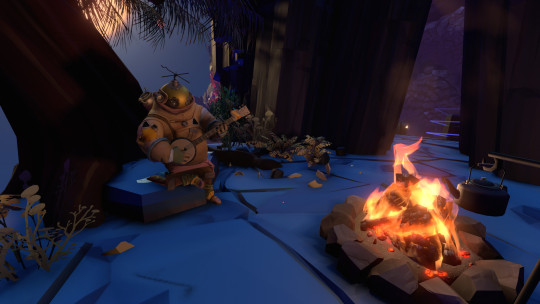
The first time the sun exploded in my Outer Wilds playthrough, I was probably about to die anyway. I had fallen through a black hole, and had yet to figure out how to recover from that, so I was drifting listlessly through space with diminishing oxygen as the synths started to pick up and I watched the sun fall in on itself and then expand throughout the solar system as my vision went went. The moment gave me chills, not because I wasn’t already doomed anyway, but because I couldn’t help but think about my neighbors that I had left behind to explore space. I hadn’t known that mere minutes after I left the atmosphere the solar system would be obliterated, but I was at least able to watch as it happened. They probably had no idea what happened. Suddenly their lives and their planet and everything they had known were just...gone. And then I woke up, with the campfire burning in front of me, and everyone looking just as I had left it. And I became obsessed with figuring out how to stop that from happening again.
What surprised me is that every time the sun exploded, it never failed to produce those chills I felt the first time. This game is masterful in its art, sound, and music design that manages to produce feelings so intense from an aesthetic so quaint. Tracking down fellow explorers by following the sound of their harmonica or acoustic guitar. Exploring space in a rickety vessel held together by wood and tape. Translating logs of conversations of an ancient alien race and finding the subject matter of discussion to be about small interpersonal drama as often as it is revelatory secrets of the universe. All of the potentially twee aspects of the game are balanced out by an innate sense of danger and terror that comes from exploring space and strange worlds alone. At times, the game dips into pure horror, making other aspects of the presentation all the more charming by comparison. And then there’s the clockwork machinations of the 22-minute loop you explore within, rewarding exploration and experimentation with reveals that make you feel like a genius for figuring out the puzzle at the same time that you’re stunned by the divulgence of a new piece of information.
The last few hours of the game contained a couple puzzles so obfuscated that I had to consult a guide, which admittedly lessened the impact of those reveals, but it all led to one of the most equally devastating and satisfying endings I’ve experienced in a video game recently. I really can’t say enough good things about this game. It’s not only my favorite game this year, but easily one of my favorite games of the decade, and really, of all-time, when it comes down to it.
#outer wilds#death stranding#eliza#anodyne 2#control#judgment#resident evil 2#fire emblem: three houses#Ape Out#Amid Evil#games#video games#GOTY
87 notes
·
View notes
Text
Candidate for completion - George & The Dragon
George & The Dragon
Most dragons spend their lives, comfortably, happily alone.
Jessica is not like that, because Jessica has George, and Jessica has George because they met when they were both young and they have had years of each other to grow together and George was patient enough and dense enough to just wade through Jessica’s bluntness, until it stopped being blunt and started being warm.
Had she ever just told him to go away he likely would have, being a nice chap in that way, but she never did, and so he kept coming back. Like a lost dog. And eventually Jessica realised that she liked him coming back and didn’t like those times when he wasn’t there, and that was that.
WHAT
Jessica's name, it should also be pointed out, isn't actually Jessica. Being a dragon she had a suitably grandiose and impressive draconic name, the sort of thing to be bellowed out while stood on a rocky promontory during a thunderstorm.
To properly pronounce it, however, required the kind of vocal architecture that George simply did not possess, and since he'd pointed out that the last part of the name kind of sort of maybe sounded like 'Jessica' - full of sibilance and magnificent hissing sounds - that is what he elected to call her.
And since she had something of a soft spot for the human she allowed him to get away with this.
To put it bluntly, a young man and his friend who is a dragon bum around a vaguely defined setting, hanging out, wasting time, meeting people and talking while the narration waffles on at length about absolute bollocks.
There’s hugging.
And not a whole lot of what you might typically call ‘plot’.
WHO
“Hey, Blossom, how about I ask you a question?” George asked, asking to ask a question by asking a question. Blossom was delighted - trees loved questions, both giving and receiving them.
“Fire away,” they said.
“Where are you right now?” George asked. It had been tugging at his brain, this question.
“Technically speaking I am wherever I am - you’re talking about where most of me is right now, aren’t you?” Blossom asked. They had seen this question coming. It was fairly common.
“Yes?” George said, unsure.
“The tree part, you’re talking about the tree part,” Blossom clarified.
“Yes!” George said, now sure.
There are two main characters. There is George, who is human, and Jessica, who is a dragon. They are friends and have been since they were little. Because of this Jessica is not like most other dragons, who are grumpy loners. She is grumpy and possessive of George and other than him is a loner.
George is cheerful and outgoing and just loves meeting new people, and there are all sorts of people to meet! And he also thinks Jessica could benefit from having even more friends - after all, he’s her friend and look how well that turned out!
Thus.
Related to these two and following close behind are the other two friends, Capability (aka Billy) who is an elf (specifically a princess, because I like princesses) and Blossom who is a tree. They’re kind of tangential but are still important.
What I am attempting to do with these schlocky fantasy stock characters (and some others, later) is deliver them in a sufficiently idiosyncratic way to make their interactions, well, if not interesting then at least not just standard. A point of this hackneyed setting is that despite everyone operating on a different level everyone just gets along, because.
I don’t just want different-shaped humans. Even if they’re vaguely human shaped, I want the way their lives run to be different enough that their values might not necessarily line up, but everyone gets on anyway, yeah?
So - and this is where it starts getting dicey, at least in my mind - you have characters like Blossom, who is big grove of thinking trees somewhere but who interacts with everyone else by growing a wooden body with flowing hair of flowers that goes off and does all the talking. And, being a tree, is amused and unaffected by such flesh-and-blood concepts of gender because, well, they’re a tree. They also wear nice big fluffy jumpers.
The dicey part in there for me is the gender part. I’ve mentioned before that I’m probably the straightest, whitest, malest person you could ever hope to meet and if I haven’t I’m mentioning it now. I’m likely brimming with prejudices I’m not even aware of and spilling careless words like a drunk spills their drink. But I just want a story where everyone, no matter who they are and how they interact with the world, gets along. And none of it is ever called into question. It just is. People might be curious and ask questions, but only so they know the answer and not continue being wrong, not because they want to start poking holes.
Elves reproduce by spores, fine. Trees love to meet people and don’t really get fucking, fine. Dragons are incredibly myopic about the things they like and if something isn’t a thing they like then they don’t give two shits, fine. Humans are everywhere for a very specific reason but no-one makes a deal out of it, fine. Everyone gets along anyway, and all is well in the world. What’s for dinner?
I’m doing a bad job of explaining this...
WHERE
The past is - not was, is - full of monsters, it’s true, and the intention is to try and ensure that the future isn’t. You can’t ever be rid of monsters, of course. That’s not how it works. But you can certainly do your best to keep them to a minimum and ensure that those times they do pop up (and they will pop up) the damage they inflict is limited.
To actually bash George & The Dragon into something with a beginning, a middle and an end I’d need a plot to lash the whole thing around, some structure. Right? Right.
The story as it is right now - such as it is - is just chunks strung together, vaguely detailing George and Jessica going on a small holiday together to some town, eating steak, meeting Blossom, meeting Billy and generally just...
...hanging out.
And she manhandles him because she’s a whacking great dragon and dragons have difficult dealing with others and certainly have no real concept of friendship and yet she does and it’s all confusing and oh aren’t they just lovely together blah blah blah. Self-indulgent. I like this kind of shit.
Which is the whole point of the thing, for me, but lacks any actual drive or goal or anything. It’s just fluff. Which was the point, for me. But to have a hook on which to hang the fluff - something people sometimes desire - I’d need something else.
There’s vague ideas later in the story for George’s uncle Bob (who vanished in a magic-related accident years ago) to pop back. He’ll be fine, of course, as this story is about people being fine, and he’ll then start up a business of going around the world looking at weird crap, for this world I cooked up is meant to be full of weird crap (the ground was mentioned to be missing in some places).
Likewise, the world is also heavily implied (and in some cases outright stated) to have once been much, much worse. As in, everyone used to kill everyone else all the time until one day they all realised it was a huge waste of time and so they stopped. So the world has seen some shit, and is still full of weird stuff from ages past if you go out looking for it.
This leads to things like digging up a magically slumbering human from the old times who is appalled at how peaceful things are now.
And later they find a door into our world and someone falls through it, and he’s appalled at how peaceful things are. It’s quite explicit.
There’s dragons under the ground, too. Eventually they get super-big and just sink under the ground and turn to stone and sleep forever. That’s what’s going to happen to Jessica, eventually.
What was I saying?
Oh yeah. And so Jessica and George would then basically have an excuse to go off and see more stuff and meet more people and, uh...
What was I saying?
WHY
“Back in the real world - my world - cream is not what rises to the top, typically. In fact, let’s run with this imagery. Forget cream at all. There is no cream. Never was, never will be. No milk either. It’s just shit. And you might think that, well, it’s just shit on top, if we reach down through that we might find something of value, something hidden. But no. It’s just shit all the way down. Runnier, maybe, less rancid perhaps. But still shit. That’s life. Top to bottom, shit. That’s the people in life, too. People are, without fail, varying level of stupid, ugly and slow. The ratios differ, the ingredients do not. That’s the real world. That’s how things are meant to work. This place is all wrong.”
The point is fluff. The explicit point is fluff. I wrote this initially for my own edification and because I have a huge soft spot ‘Guy and something that is not human have a very close friendship that maybe could be a bit more but doesn’t necessarily have to be’.
Bite me. We all have our vices.
So that’s the point. It’s mainly about these two people who like each other hanging around and doing stuff. Eating steak, swimming in a lido, random crap like that. One of them is a dragon and can turn into a duck because dragons can change shape, why not. Just two people, having a good time.
The other point is, uh, trying to just navel-gaze about a more pleasant place. Wish-fulfillment? Escapism? Something like that.
A lot of what I write here (and you may have noticed this) tends to be a bit miserable, a bit maudlin, a bit nihilistic, maybe. Run For It!, for example, is just misery after misery after misery, that’s just how it is.
But sometimes I just want to write about getting hugged by a dragon, alright! In a world where that’s seen as cutely novel! And your other friend is a tree! And they pull their finger off and give it to you and you plant it and grow another one of them! And your other other friend is an elf princess who has wings and who looks out for all the non-princess elves in town because that’s just what she does! And you all go out and eat ice cream!
What was I saying?
WELL
Normal is not a stick to beat people with. Because if you do start doing that you end up having to beat everyone with it because no-one fits perfectly and they might start threatening to take the stick away from you because you can’t be trusted with it and then no-one would listen to you and someone else might get the stick and hit you so you just keep hitting and hitting.
What’s the point?
There’s a line that runs through this whole thing. A dividing line.
On the one side there’s the simple, straightforward and self-indulgent stuff.
On the other, there’s my cack-handed efforts at, uh, trying to be diverse, I guess would be the word? I don’t know. I just want - calling it variety makes it sound like a novelty act - uh...
...broadness.
The main guy might just be another hacked-up version of me but I want others coming from all angles. But I don’t know those angles! And I’m ever-fearful that I’ll get them horribly, horribly wrong.
Suppose this is why, uh, sensitivity readers are a thing?
Not that anyone ever really reads anything I do anyway, not really.
Probably for the best...
2 notes
·
View notes